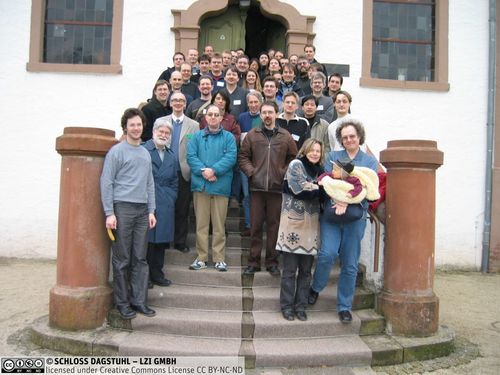Dagstuhl Seminar 04081
Theory of Evolutionary Algorithms
( Feb 15 – Feb 20, 2004 )
Permalink
Organizers
- Hans-Georg Beyer (Fachhochschule Vorarlberg, AT)
- Thomas Jansen (TU Dortmund, DE)
- Colin Reeves (University of Coventry, GB)
- Michael D. Vose (University of Tennessee, US)
Contact
The 2004 Dagstuhl seminar on the theory of evolutionary algorithm was the third following seminars in 2000 and 2002 which had the same title. These Dagstuhl seminars are recognized within the evolutionary algorithm community as a biannual series of high quality meetings concerned with theoretical aspects of evolutionary computing. Therefore, there was great interest in participating and presenting ideas. The seminar had 49 participants from twelve different countries, namely eighteen from Germany, eleven from the United States, eight from Great Britain, three from the Netherlands, two from Canada and one each from Austria, Australia, France, Japan, Mexico, Russia, and Switzerland.
From these 49 researchers, 39 were able to give a presentation. The topics of the talks were as diverse as the current status of evolutionary computation theory. There have been talks on general aspects of modeling and analyzing evolutionary algorithms, in particular talks on the pros and cons of infinite population approaches. Also different ways of classifying and analyzing landscapes defined by different problems and genetic operators have been presented. Many talks presented concrete analytical results on specific evolutionary algorithms and specific problems. Such results have been presented for both, continuous and discrete search spaces, for artificial problems or problem classes as well as for a typical combinatorial optimization problem. Recent trends like optimization of noisy objective functions, estimation of distribution algorithms, and coevolution have been topic of several talks as well as the well-established genetic programming. Other randomized search heuristics used for optimization have also been subject of talks, namely estimation of distribution algorithms and ant colony optimization.
The talks have initiated lively and partially controverse discussions. The special Dagstuhl atmosphere has helped a lot to develop a constructive atmosphere that improved mutual understanding and inspiration. The traditional hike on Wednesday afternoon and time spent together in the evenings or late at night let room for more personal discussions, too.
During the seminar the participants were introduced to the new Dagstuhl online proceedings by Jutta Huhse. The idea and advanced possibilities of the new system compared to the old reports was well received. As a result, some of the abstracts here are extended abstracts which are way more detailed than the abstracts of the previous two seminars on the theory of evolutionary algorithms.
- Dirk Arnold (Dalhousie University, CA) [dblp]
- Anne Auger (ETH Zürich, CH) [dblp]
- Wolfgang Banzhaf (Memorial University of Newfoundland, CA) [dblp]
- William Benfold (University of Southampton, GB)
- Hans-Georg Beyer (Fachhochschule Vorarlberg, AT) [dblp]
- Jürgen Branke (KIT - Karlsruher Institut für Technologie, DE) [dblp]
- Anthony Bucci (Brandeis University - Waltham, US)
- Kenneth A. De Jong (George Mason University - Fairfax, US) [dblp]
- Stefan Droste (TU Dortmund, DE)
- Anton V. Eremeev (Sobolev Institute of Mathematics - Omsk, RU) [dblp]
- James A. Foster (University of Idaho, US)
- Marcus Gallagher (The University of Queensland - Brisbane, AU) [dblp]
- Oliver Giel (TU Dortmund, DE)
- Jens Gottlieb (SAP SE - Walldorf, DE)
- Walter J. Gutjahr (Universität Wien, AT)
- Jonathan Hallam (University of Southampton, GB)
- Nikolaus Hansen (ETH Zürich, CH) [dblp]
- William E. Hart (Sandia National Labs - Albuquerque, US)
- Jeff Horn (Northern Michigan University - Marquette, US)
- Jutta Huhse-Merz (Schloss Dagstuhl, DE)
- Christian Igel (Ruhr-Universität Bochum, DE) [dblp]
- Jens Jägersküpper (TU Dortmund, DE)
- Thomas Jansen (TU Dortmund, DE) [dblp]
- Yaochu Jin (Honda Research Europe - Offenbach, DE) [dblp]
- William B. Langdon (University of Essex, GB) [dblp]
- Anthony Liekens (TU Eindhoven, NL)
- Nicholas Freitag McPhee (University of Minnesota - Morris, US)
- Peter Merz (TU Kaiserslautern, DE)
- Silja Meyer-Nieberg (TU Dortmund, DE) [dblp]
- Martin Middendorf (Universität Leipzig, DE)
- Adam Prugel-Bennett (University of Southampton, GB) [dblp]
- Colin Reeves (University of Coventry, GB)
- Franz Rothlauf (Universität Mannheim, DE) [dblp]
- Jonathan Rowe (University of Birmingham, GB) [dblp]
- J. David Schaffer (Philips Labs. - Briarcliff Manor, US)
- Lothar M. Schmitt (The University of Aizu, JP)
- Jonathan L. Shapiro (University of Manchester, GB) [dblp]
- Jim E. Smith (University of the West of England - Bristol, GB)
- Peter F. Stadler (Universität Leipzig, DE) [dblp]
- Christopher Stephens (Universidad Nacional Autonoma - Mexico, MX)
- Dirk Thierens (Utrecht University, NL) [dblp]
- Marc Toussaint (University of Edinburgh, GB) [dblp]
- Paul M. B. Vitanyi (CWI - Amsterdam, NL)
- Michael D. Vose (University of Tennessee, US) [dblp]
- Ingo Wegener (TU Dortmund, DE)
- Karsten Weicker (Universität Stuttgart, DE)
- R. Paul Wiegand (Naval Research - Washington, US)
- Carsten Witt (TU Dortmund, DE) [dblp]
- Alden Wright (University of Montana - Missoula, US)
- Annie S. Wu (University of Central Florida - Orlando, US)
Related Seminars
- Dagstuhl Seminar 00071: Theory of Evolutionary Algorithms (2000-02-13 - 2000-02-18) (Details)
- Dagstuhl Seminar 02031: Theory of Evolutionary Algorithms (2002-01-13 - 2002-01-18) (Details)
- Dagstuhl Seminar 06061: Theory of Evolutionary Algorithms (2006-02-05 - 2006-02-10) (Details)
- Dagstuhl Seminar 08051: Theory of Evolutionary Algorithms (2008-01-27 - 2008-02-01) (Details)
- Dagstuhl Seminar 10361: Theory of Evolutionary Algorithms (2010-09-05 - 2010-09-10) (Details)
- Dagstuhl Seminar 13271: Theory of Evolutionary Algorithms (2013-06-30 - 2013-07-05) (Details)
- Dagstuhl Seminar 15211: Theory of Evolutionary Algorithms (2015-05-17 - 2015-05-22) (Details)
- Dagstuhl Seminar 17191: Theory of Randomized Optimization Heuristics (2017-05-07 - 2017-05-12) (Details)
- Dagstuhl Seminar 19431: Theory of Randomized Optimization Heuristics (2019-10-20 - 2019-10-25) (Details)
- Dagstuhl Seminar 22081: Theory of Randomized Optimization Heuristics (2022-02-20 - 2022-02-25) (Details)
- Dagstuhl Seminar 24271: Theory of Randomized Optimization Heuristics (2024-06-30 - 2024-07-05) (Details)


